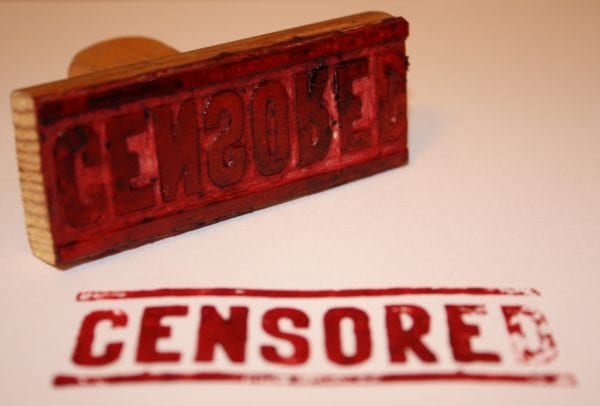
On April 17, 2016, the Daily Times—a major English-language newspaper in Pakistan—published an editorial on the nation’s controversial blasphemy law. The law, according to Human Rights Watch, carries a mandatory death penalty for blaspheming against Islam. The article was published in the wake of renewed controversy over Aasia Bibi, the first woman ever convicted and sentenced to death under the blasphemy law in November 2010 for an incident in 2009. All told, no person convicted of blasphemy has been executed, but 53 people have been killed in extra-judicial violence (Ijaz, 2016).
Given the controversial nature of the law and intentionally provocative publication of the editorial, the Daily Times anticipated a deluge of comments from online readers. The article was ideal for launching the “Free My Voice” campaign. Most contemporary news outlets have websites and the majority of story webpages include a comment feature where users can post feedback, opinions, or questions below a piece of reporting. While there are some sites that moderate comments—deleting those deemed inappropriate or editing for clarity—it is not common practice to meaningfully alter the reader’s message. That is exactly what happened on the Daily Times editorial. The Daily Times teamed up with ad agency Grey Singapore and free speech organization ARTICLE 19 to launch the “Free My Voice” campaign as a way to protest restrictions on press liberty.
When users tried to comment on the blasphemy editorial, an algorithm automatically reversed the meaning of their post. For example, a comment written to say “the author is correct. The current laws in Pakistan are a distortion of Islam” would instead read “the author is wrong. The current laws in Pakistan aren’t a distortion of Islam” (Smith, 2016). No matter how many times a comment was typed, it would reverse meaning. Readers could not leave a comment that accurately reflected their position. Eventually, potential posters were “led to a landing page to sign a petition or donate toward the Free My Voice campaign” (Hicks, 2016).
According to the Daily Times, the “statements were altered, real-time, on the medium they would least expect censorship to happen—the comment box.” They furthered that the point of the program was to make commenters “experience censorship first-hand to make them feel the frustration of what it is like to lose [a] fundamental right” (Smith, 2016). In a story they published about the project, the Daily Times explained censorship is common in Pakistan; it is ranked as the fourth most dangerous country for journalists by the International Federation of Journalists. They also deem the blasphemy law one of the “country’s biggest threats to free speech” (Smith, 2016).
In addition to the blasphemy law, the project was a response to a newly approved Electronic Crimes Bill, which gave the Pakistani government greater power to block the spread of information, potentially arbitrarily. Tahmina Rahman, Regional Director for ARTICLE 19 Bangladesh and South Asia, expressed hope the “collaboration will demonstrate the pernicious nature of censorship that so often goes unseen but has untold consequences for society” (ARTICLE 19, 2016). Shehryar Taseer, the Daily Times publisher, justified the project saying “we all have to take a stance against censorship,” which is becoming “a global issue” (Smith, 2016).
The idea was to make citizens who might take their freedom of speech for granted experience the same censorship that stifles the press, motivating them to fight back on behalf of journalists. However, there is a potentially unacknowledged irony in censoring citizens engaged with the news to highlight the problem of censoring the press. Citizens are not being directly silenced—prevented from speaking—but censored through forced alteration of their words, words still attributed to them through a username and photo next to the posted comment. The project risks falling into the same ethical trap it claims to oppose, thus alienating citizens who might otherwise support them, especially in a climate where some comments or their engineered opposites may be politically controversial. The Daily Times project could put citizens in risky social or legal territory. “Free My Voice” potentially strips readers of their autonomy in an effort to regain journalistic integrity. While many would agree that the pursuit of a free press is admirable, some might worry about the ethical value of the tactics used by the Daily Times and its collaborators. To what extent can actual and unsuspecting readers be used in a news outlet’s effort to bring public attention to common, but sometimes unnoticed, curtailments of media freedom?
Discussion Questions:
- Does the “Free My Voice” discussion harmfully limit discussion of the blasphemy law? What are potential worries about using an algorithm to change the meaning of reader comments?
- Should press organizations like the Daily Times protest censorship so directly if it risks further restrictions of their freedoms and ability to provide the public with information?
- What obligation, if any, do citizens have to donate, sign petitions, or otherwise participate in protests by journalists?
- Is censoring, or forcefully altering, citizen comments an ethical way to critique government censorship?
- Do acts of protest have to have the consent of all involved, or all affected by the protest?
Further Information:
ARTICLE 19, “Pakistan: ARTICLE 19 and Daily Times bring censorship home for online readers.” ARTICLE 19, April 17, 2016. Available at: https://www.article19.org/resources/pakistan-article-19-and-daily-times-bring-censorship-home-for-online-readers/
Robin Hicks, “Agency’s algorithm flips sentiment of comments in article about Pakistan’s blasphemy law.” Mumbrella Asia, May 30, 2016. Available at: https://www.mumbrella.asia/2016/05/grey-singapore-idea-for-pakistan-newspaper-inverts-sentiment-of-comments-for-press-freedom-message
Saroop Ijaz, “Facing the death penalty for blasphemy in Pakistan.” Human Rights Watch, October 12, 2016. Available at: https://www.hrw.org/news/2016/10/12/facing-death-penalty-blasphemy-pakistan
Sydney Smith, “Pakistani newspaper alters readers’ comments to make censorship point.” iMediaEthics, May 31, 2016. Available at: https://www.imediaethics.org/pakistani-newspaper-alters-readers-comments-make-censorship-point/
Authors:
Dakota Park-Ozee & Scott R. Stroud Ph.D.
Media Ethics Initiative
Center for Media Engagement
University of Texas at Austin
February 20, 2020
Image: The Daily Times
This case was produced by the Center for Media Engagement with support from the South Asia Institute. It can be used in unmodified PDF form for classroom or educational settings. For use in publications such as textbooks, readers, and other works, please contact the Center for Media Engagement.
Ethics Case Study © 2020 by Center for Media Engagement is licensed under CC BY-NC-SA 4.0



